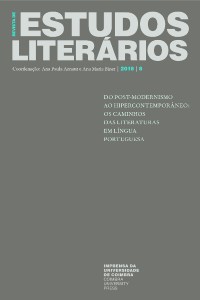Please use this identifier to cite or link to this item:
https://hdl.handle.net/10316.2/45136| DC Field | Value | Language |
|---|---|---|
| dc.contributor.author | Magalhães, Carlos Augusto | - |
| dc.date.accessioned | 2019-01-18T15:03:17Z | |
| dc.date.accessioned | 2020-09-16T23:32:08Z | - |
| dc.date.available | 2019-01-18T15:03:17Z | |
| dc.date.available | 2020-09-16T23:32:08Z | - |
| dc.date.issued | 2018 | - |
| dc.identifier.issn | 2182-1526 | - |
| dc.identifier.issn | 2183-847X (PDF) | - |
| dc.identifier.uri | https://hdl.handle.net/10316.2/45136 | - |
| dc.description.abstract | The city and the urban, thought of, lived and experienced as expanded and unstable space-times, show themselves as a fragmentary physical, social, economic, political, and cultural texture, but they also fl aunt an unarguable density and live in a turbulent and steadfast (Crang e Thrift, 2000). This article aims to analyse the interactions with the urban space and its expansion processes in the brazilian big cities. It aims to discuss the representations of the urban culture, gazing upon the relations with the streets located in the downtown area of the brazilian modernized cities in the 40’s, 50’s, 60’s and 70’s. The article also thinks over the contacts with the (hyper)contemporary city – multifaceted, dispersed, unequal, contradictory. The readings of the nowadays Porto Alegre are explained through and above all, the reconfi gurations of the urban spaces, thinking over the presence of the slums, another symbol of the brazilian inequality. The representations of violence, anonymity and social stratifi cation are observed in the narratives “Verão” and “A aventura prático- -intelectual do Sr. Alexandre Costa”, texts in Os lados do círculo (2005), by Amílcar Bettega Barbosa. Both the short stories have as their theme the contemporary urban violence: the murder of homeless people by a serial killer in the short “A aventura prático-intelectual do Sr. Alexandre Costa”, and the murder of the businessman Wagner Henrique, a result of arguments between Wagner and the residents of the slum Vila Cruzeiro, in the narrative “Verão”. | eng |
| dc.description.abstract | A cidade e o urbano, pensados, vivenciados e experienciados como lugares- -tempos expandidos e instáveis, apresentam-se como uma tessitura física, social, econômica, política e cultural fragmentária, mas que ostenta a indiscutível densidade e vive em turbulenta e constante metamorfose (Crang e Thrift, 2000). O artigo se propõe analisar as interações com o espaço urbano e seus processos de expansão nas grandes cidades brasileiras. Busca-se discutir as representações da cultura urbana, pensando-se nas relações com as alegres ruas do Centro da modernizada cidade brasileira das décadas de 40, 50, 60, 70 do século xx. Refl ete-se também sobre os contatos com a cidade (hiper)contemporânea – multifacetada, dispersa, desigual, contraditória. Explanam-se leituras da cidade de Porto Alegre atual, por intermédio, sobretudo, das reconfi gurações dos espaços urbanos, pensando-se, inclusive, na presença da favela, Outro tomado como símbolo da desigualdade brasileira. Observam-se as representações da violência, do anonimato, da estratifi cação social, aspectos que comparecem nas narrativas “Verão” e “A aventura prático-intelectual do Sr. Alexandre Costa”, produções integrantes da antologia Os lados do círculo (2005), de Amílcar Bettega Barbosa. Ambos os contos tematizam a violência urbana hipercontemporânea: o homicídio de pessoas moradoras de rua por um serial killer, no texto “A aventura prático-intelectual do Sr. Alexandre Costa” e o assassinato do empresário Wagner Henrique, resultado de embates entre ele e a população da favela da Vila Cruzeiro, na narrativa “Verão”. | por |
| dc.language.iso | por | - |
| dc.publisher | Imprensa da Universidade de Coimbra | - |
| dc.rights | open access | - |
| dc.subject | urban violence | eng |
| dc.subject | exclusion | eng |
| dc.subject | anonymity | eng |
| dc.subject | hypercontemporary literature | eng |
| dc.subject | Amilcar Bettega Barbosa | eng |
| dc.subject | violência urbana | por |
| dc.subject | exclusão | por |
| dc.subject | anonimato | por |
| dc.subject | literatura hipercontemporânea | por |
| dc.subject | Amílcar Bettega Barbosa | por |
| dc.title | Desigualdade, exclusão e violência urbana em narrativas hipercontemporâneas | por |
| dc.title.alternative | Inequality, exclusion and urban violence in hypercontemporary narratives | eng |
| dc.type | article | - |
| uc.publication.collection | Revista de Estudos Literários nº 8 | - |
| uc.publication.firstPage | 75 | - |
| uc.publication.issue | 8 | - |
| uc.publication.lastPage | 100 | - |
| uc.publication.location | Coimbra | - |
| uc.publication.journalTitle | Revista de Estudos Literários | - |
| dc.identifier.doi | 10.14195/2183-847X_8_3 | - |
| uc.publication.section | Secção Temática | - |
| uc.publication.digCollection | IP | - |
| uc.publication.digCollection | B1 | - |
| uc.publication.orderno | 5 | - |
| uc.publication.area | Artes e Humanidades | - |
| uc.publication.manifest | https://dl.uc.pt/json/iiif/10316.2/45136/217042/manifest?manifest=/json/iiif/10316.2/45136/217042/manifest | - |
| uc.publication.thumbnail | https://dl.uc.pt/retrieve/11272357 | - |
| uc.publication.parentItemId | 71388 | - |
| uc.itemId | 71537 | - |
| uc.thumbnail.uri | https://dl.uc.pt/iiif-imgsrv/11272302/dl!3!75!33!38!75333873726376681854528321134592993038 | - |
| item.grantfulltext | open | - |
| item.fulltext | With Fulltext | - |
| Appears in Collections: | Revista de Estudos Literários | |
Files in This Item:
| File | Description | Size | Format | |
|---|---|---|---|---|
| desigualdade__exclus_o_e_violencia_urbana.pdf | 400.53 kB | Adobe PDF |  |
Items in DSpace are protected by copyright, with all rights reserved, unless otherwise indicated.
